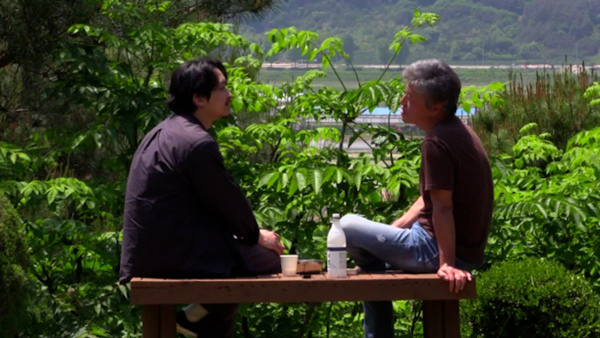The Parent Trap: Sang-soo Takes Sideways Swipe at Social Etiquette
A constant purveyor of how subtle social cues are obliterated by the lowered inhibitions of alcohol, Hong Sang-soo unveils his meatiest narrative in years with What Does That Nature Say To You. The set-up is familiarly threadbare, with numerous lackadaisical interactions between some sort of creative type confronted by new people whose orbits slowly circle one another as they engage in an eat/drink/be merry scenario. But it builds to a surprisingly weighty climax in a third act which is more confrontational about duplicitous human behaviors than most of his past works.
Junhee (Kang Soyi) has been dating Donghwa (Ha Seong-guk), a poet, for the past three years but he’s yet to meet her parents. When he gives her a ride from Seoul to her parents’ home in Icheon, he’s curious to see the house, which sits on an expansive hilltop. Her father (Kwon Hae-hyo) commiserates with the younger man and invites him to dinner, a chicken stew made from some of their own poultry on the property. While dinner is being prepared, Junhee and her older sister Neunghee (Park Mi-so) take Donghwa to visit a Buddhist temple, which generates a minor argument. Returning home for dinner, Donghwa is introduced to their mother, Sunhee (Cho Yunhee), who is a poet herself. As the dinner progresses and alcohol is imbibed, Donghwa overreacts when he’s prodded to explain his contentious relationship with his father, a notable attorney.

Of the five main characters, only one is new to the Sang-soo fold, with Kang Soyi making her film debut as Junhee. But doing the heavy lifting is Ha Seong-guk as the rather hapless Donghwa, a mid-30s poet who has an estranged relationship with his wealthy, well-renowned father, a noted attorney whom Junhee’s parents know of. This meeting appears to be accidental, and Junhee hasn’t attempted to build this connection despite having dated him for the past three years, likely because she’s been waiting for Donghwa to settle into being something more than a starving artist who is committed to remaining independent from his father. Kwon Hae-hyo, as usual, provides instant comic relief as Junhee’s inquisitive father, desiring to take Donghwa’s jalopy, a 1996 Kia, for a spin. The car becomes something of a sticking point for Junhee’s family, who can’t fathom why he won’t bother to get a newer car.
The day unfolds as simply as any other Sang-soo venture. A delicious lunch followed by a trip to a Buddhist temple by the couple with Junhee’s purportedly depressed sister feels like any other lazy aside, though a small tiff ensues when Donghwa goes off on a rant about how he knows nothing (about life). As could be predicted, once Choi Sunhee makes an appearance, a comic shift begins to build. The overly complimentary parents quiz Donghwa about his work and family life, plying him with a seemingly endless onslaught of liquor. But Neunghee’s constant reminders of his wealthy upbringing begins to work on Donghwa’s nerves, leading to an explosive drunken outburst. When he’s put to bed, Junhee’s parents have their own drunken discussion about how they really feel about him (“He has no talent,” remarks Sunhee), as they observe his failure to pass their ‘alcohol test.’
Much like Sang-soo’s medium-length 2023 title In Water, this feature is filmed in low-res, meant to match how Donghwa, who suffers from blurry vision, sees the world (and according to him, that’s how he prefers it). Metaphorically, this operates on several levels, both as the character being a potential cypher for Sang-soo himself, but also commentary on how Donghwa is a young man who’s willfully adrift, blissfully ignorant about what being an adult requires. A final sequence involving his supposedly trusty Kia features Donghwa in a blurry close-up, the perfect exemplification of where he is in life, so close to himself but willfully out of focus.
Reviewed on February 21st at the 2025 Berlin International Film Festival (75th edition) – Main Competition. 108 mins.
★★★★/☆☆☆☆☆


